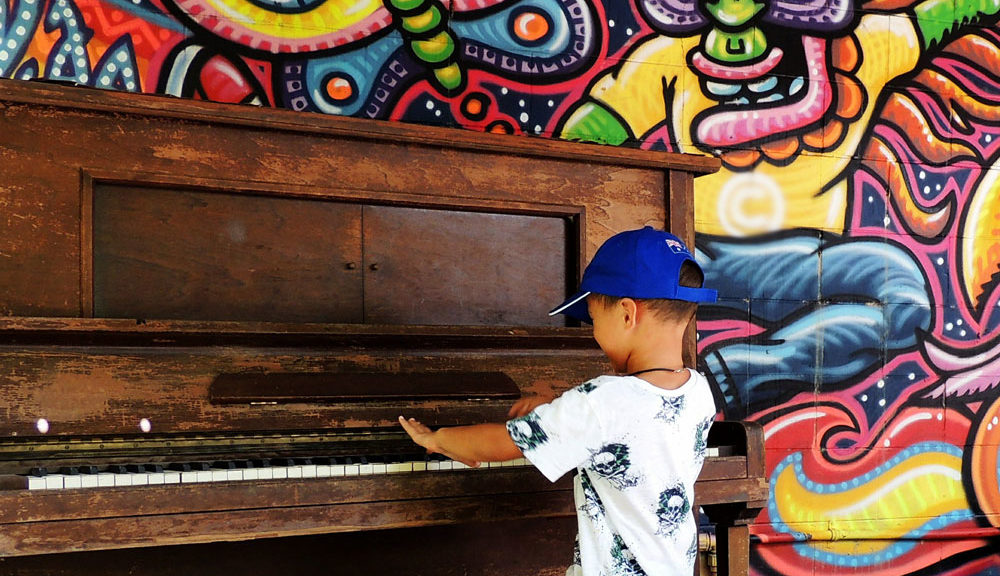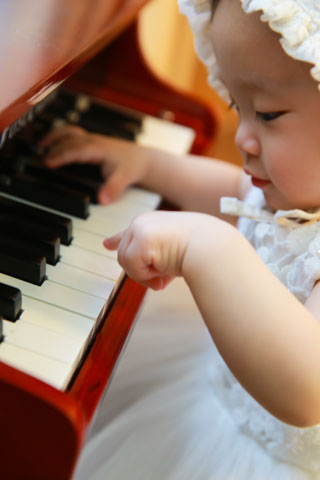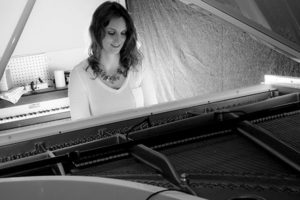
“When Should My Child Start Piano Lessons?”
If you already know the benefits of studying music as a child, you’re probably wondering what age your child should begin lessons. Further, what instrument should he or she begin with?
 The earlier your child begins to explore music, the better. Instruction can begin informally at home or in parent-child classes, learning to clap to the rhythm of songs, sing along and listen for different instruments. Depending on your family’s focus on music and your child’s natural inclination and curiosity, the age at which they are ready for formal lessons is not so much what matters – but more so their ability to focus, follow direction and take instruction.
The earlier your child begins to explore music, the better. Instruction can begin informally at home or in parent-child classes, learning to clap to the rhythm of songs, sing along and listen for different instruments. Depending on your family’s focus on music and your child’s natural inclination and curiosity, the age at which they are ready for formal lessons is not so much what matters – but more so their ability to focus, follow direction and take instruction.
For reference, my youngest piano student thus far is four years old and she began reading music on the staff (no letters) after four months of lessons. She is not a musical prodigy, but she is attentive and likes the music theory worksheets we work on in lessons. She also thoroughly enjoys sound, as she likes to sing the names of notes as she plays them (as I discovered, a very effective way for me to teach her!).
One of my favorite parts about teaching young students is finding out what it is about music that captures their attention – then capitalizing on that to teach everything else they need to know but may not be as exciting. I always make sure there is a bit of cheese on the brussel sprouts, if you will. 🙂
From a developmental standpoint, here’s a checklist of questions to find out if your son or daughter is ready for formal piano lessons:
My child can…
1. Distinguish between right and left hand.
Playing piano involves both hands and we begin using them both from the start. Your child should be able to distinguish between right and left.
Even if he or she is still a bit confused from time to time, beginning lessons can even help clear this up – since now there will be an association with the left hand making low sounds and the right had making high sounds on the piano.
2. Count to and recognize numbers 1 through 5.
Each finger is numbered one through five. When we first begin, this is how the child will know which key to play – no naming the notes, just learning how to use the fingers to make sound. It is very important that these numbers are recognized.
As with distinguishing between right and left, even if your child is a bit confused about numbers, beginning lessons may help the confusion as now we can associate the numbers with fingers, sounds and fun!
3. Understand some addition (1+1=2, 2+2=4).
This point is related to counting beats. If your child understands these two addition concepts, it will help him or her understand the differences between quarter, half and whole notes.
If you don’t know what I mean by quarter, half and whole notes, or your child is still a bit confused by addition – no worries. We can begin by counting beats and music instruction will actually help your child learn these addition concepts. Again, we are creating more neural (brain) pathways to learn math when we stimulate the brain with music instruction!
4. Recognize and recite the alphabet letters A through G.
Pretty quickly we will begin naming the keys on the keyboard. Again, taking music lessons can help a child with some of the letter recognition, but progress in piano will be faster if he or she already knows these letters well. If the child does not recognize these letters, we’ll be spending more instruction time on letter recognition than music (which I am more than willing to do) but progress in music will be slower.
The musical alphabet only goes up to G – so even if your child knows the entire alphabet, he or she will need to understand that the music alphabet only goes up to G. This is something I will teach your child in lessons, so this is just more something for you to be aware of if you’re not a musician yourself.
5. Focus for 20-30 minutes.
Attention spans are of critical importance to the success of formal lessons: for both lesson time and sitting at the piano or keyboard at home.
During lessons, we will have a mix of activities – playing music, listening to music, clapping, singing and worksheets. This variety can therefore increase the child’s usual attention span. Lessons for my youngest students are 30 minutes in length, which is usually the perfect amount… I can always see it in their eyes when they’re about to max out on information and are ready to go home for play time 🙂
At home, young students should be able to sit and practice for about 10 minutes at home each day. If they can do more, that’s great – the more, the better! If they can only get to it every other day, that’s okay, too. Just like anything else in life, the more time and effort goes into it, the more you get out of it. But regardless of the student’s pace of progress, my aim is always to keep the student engaged and having fun… Music is a lifelong love and my goal is to keep their fire alive and well.
6. Has an Interest in Playing Music.
This one is the most important. If your child is not interested in music, even with the best attention span this is not going to work out. Music is great for brain development but that’s not what it’s all about. Music can be a lifelong hobby, a future career or just something for which the student can have lifelong appreciation. But if the student is not interested and lessons are forced upon the child, it could really turn them against music. Even if the child may have become interested on his or her own in another few years.
If you believe in the value of music and music education but your child does not yet agree, start first with sharing your love of music in a non-forceful way. Listen to your favorite music. Sing. Dance. Enjoy music the way you enjoy music and let your child be as much a part of that as he or she likes. Let your child see you enjoy music without guilt-trips! Allow your child explore to other types of music and find the genre that perks up those ears and speaks to his or her soul. Take an interest in his or her tastes as they develop! Music is also about making us whole and fulfilled human beings, relating to one another and creating invisible but strong bonds. This can be the basis upon which a real, organic love of music can grow, so your child can reap a lifetime of benefits.
Don’t Wait to Begin Lessons!
If your child is ready for lessons, don’t wait to start! The earlier music education begins the better! When training begins before age seven, the effects on the brain will last a lifetime! Students who started at age nine, with as few as four years of training, were shown to have lasting effects on some brain functions 40 years later.
Even if your child isn’t quite ready, you can help your child prepare for formal lessons. Dance, sing, clap to the beat and watch performances together from a young age to develop interest and begin working on the six points above.
If you’re still not sure, contact me by phone or using the form below and we can talk about your child’s interest and development – and when might be the best time for your child to begin!
Related Articles Recommended for You

Read More

Read More

Read More

Read More

Read More

Read More
